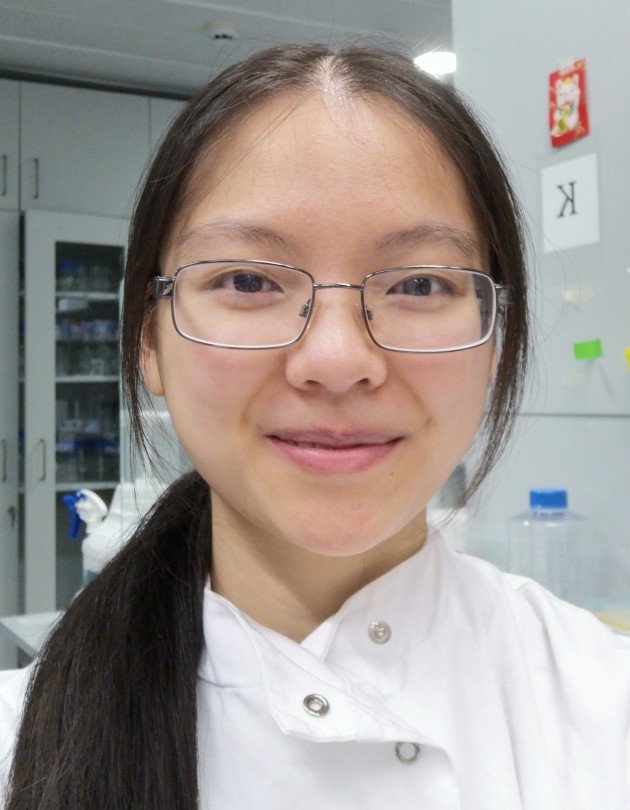Tell us a bit about yourself and your background – e.g. where and what did you study prior to undertaking your Master’s?
 Before coming to Imperial, I studied Natural Sciences at the University of Cambridge. As I’m from a relatively modest background in Bradford, West Yorkshire, attending a top-ranking university was uncommon in my environment, and I only began to seriously consider it when I discovered the wide range of financial support that was available to me. After graduating I wanted to gain more practical experience in a laboratory environment, which led me to apply for the MRes in Biomedical Research at Imperial.
Before coming to Imperial, I studied Natural Sciences at the University of Cambridge. As I’m from a relatively modest background in Bradford, West Yorkshire, attending a top-ranking university was uncommon in my environment, and I only began to seriously consider it when I discovered the wide range of financial support that was available to me. After graduating I wanted to gain more practical experience in a laboratory environment, which led me to apply for the MRes in Biomedical Research at Imperial.
Where / what are you working on now?
I am currently in the second year of my PhD at Imperial, and my project is in one of the labs where I did a placement during my Master’s. The project is focused on gaining structural and biochemical insights into tumour suppressor proteins to better understand their roles in DNA repair.
What motivated you to choose this specific course as opposed to studying elsewhere?
I was most drawn to the opportunity to undertake two research placements during this course as most Master’s programmes that I had seen only offered one project. As I was still undecided in the particular field I wanted to specialise in, this course gave me the perfect opportunity to explore different research topics and find what interests me the most.
What did you enjoy most about this programme?
I really liked that the course allowed us to develop a wide range of skills. As well as the practical lab placements, we learnt about other aspects of research such as peer review and grant writing, and we also had many opportunities to develop our scientific communication skills. Overall, it provided a well-rounded training for a future scientific career!
What aspects did you find the most challenging?
The grant writing exercise was challenging as it introduced us to an aspect of research that I previously hadn’t been exposed to much – planning and budgeting long-term research goals, and convincing a funding panel that this research is worthwhile. Although it was difficult to write about research in this new style, it was ultimately a very eye-opening experience and gave me a greater appreciation for the work that goes into preparing grant proposals, and for the funding committees that review them.
What are the main skills you gained as a result of studying on this course?
The course gave me more confidence in independently carrying out my own research - thinking through hypotheses, designing experiments to test these, and planning further experiments after analysing the data I obtained. It also developed my scientific communication skills through various mediums such as poster presentations, presenting in seminars, as well as report writing.
How did receiving a Faculty of Medicine postgraduate scholarship benefit you and your studies?
The scholarship was invaluable in helping me to pursue my goal of developing my research skills in a postgraduate Master’s course. The support that the scholarship provided meant that I could make the move to a world-leading institution in London with less financial worries – allowing me to make the most of this exciting and fast-paced city.
What advice would you give to someone considering applying to the programme?
Try to showcase what excites you or interests you in carrying out research and describe how the programme would build upon your previous experiences and fits in with your future career plans. It might also be good to look into the labs at Imperial to get an idea of the research that is being done, as some of these labs may be your host during the placements in the programme – you can even contact some of them yourself to set up your own placement during the course.
What are your goals/direction for the future?
I am currently interested in continuing in academic research after I have completed my PhD as I have really enjoyed being able to direct my own experiments and work towards gaining novel insights into tumour suppressor proteins. By continuing in this career path, I hope that my research will be able to make a contribution to understanding DNA damage and repair, and how these mechanisms can go awry in cancer progression.
Find out more about the MRes in Biomedical Research and apply